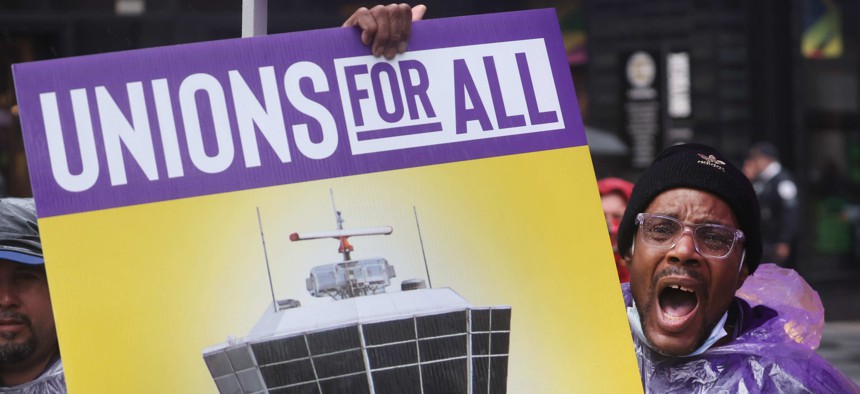Voters Will Decide This Fall on Whether to Add the Right to Unionize to One State's Constitution

Airport workers participate in a rally organized by the Service Employees International Union (SEIU) outside of the Willis Tower headquarters of United Airlines on March 30, 2022 in Chicago, Illinois. Scott Olson/Getty Images
The proposed amendment would guarantee workers in Illinois the "fundamental right" to collectively bargain over wages, hours and working conditions as well as to protect their "economic welfare."
Voters in Illinois will decide in November whether to enshrine workers' rights to unionize in the state Constitution.
The ballot measure, known as Amendment 1, would guarantee all workers in Illinois the "fundamental right" to collectively bargain over wages, hours and working conditions as well as to protect their "economic welfare."
"It's going to be a big win for our entire state,'' said Joe Bowen, communications director for Vote Yes for Workers Rights in Illinois, the labor-backed coalition leading the push in favor of the amendment. "Illinois has always been a pro-labor state and I think there's a lot of excitement and enthusiasm for this ballot measure across the board politically."
Critics of the measure say it is overly broad and would drive up costs, fuel higher taxes and concentrate power in the hands of organized labor.
"Taken together, the broad language of Amendment 1 doesn’t just guarantee a right to bargain over typical labor issues such as wages and benefits. It is a 'fundamental right' – on par with freedom of speech and religion – to bargain over virtually anything," the Illinois Policy Institute, a libertarian, pro-business think tank, posted on its website. The group and other opponents contend the ballot initiative is unconstitutional.
The measure, which cleared its final legislative hurdle in the spring, drew strong support from Democrats as well as some Republicans.
"There are a lot of Republicans and independents who are members of labor unions throughout Illinois,'' Bowen said.
"Most folks, when they think of our state they think of Chicago but the vast majority of the state is still the heartland and there are folks who have been working as pipe fitters and operating engineers, folks who have been paving our roads [and] fixing electrical systems in schools who may not vote for Democrats but they certainly understand the value that collective bargaining has had for them...those are not Democratic or Republican values, those are American values.''
Robert Bruno, a professor at the School of Labor and Employment Relations at the University of Illinois, said the ballot measure is a signal of growing support for organized labor. He cited a Gallup Poll from last year showing 68% of Americans support unions, the highest approval number since 1965.
"The terrible economic conditions that people experienced during the recession, the rapid reopening of the economy, growing income inequality and the difficulty workers faced in finding high quality jobs...highlight the need for fairness in the workplace,'' Bruno said. Those factors have driven unionization efforts across multiple workplaces, from Starbucks and Amazon to local newspapers and government offices.
Bruno said the ballot measure has its roots in a battle against organized labor led by the state's former governor, Bruce Rauner, a Republican. "The amendment is on the ballot now because during a previous period under the previous governor there was an effort to weaken the ability of workers to organize into unions and negotiate contracts,'' Bruno said.
Inequities exposed by the pandemic also fueled the movement, according to Bowen, the spokesman for the group backing the measure. "We saw a lot of the biggest corporations in Illinois and across the country do very well and make record profits during the pandemic while they were laying off workers and asking the folks who they kept employed to do more with less,'' he said.
Three states—Hawaii, Missouri and New York—have constitutional provisions outlining the right to collectively bargain, although their language is less sweeping than the Illinois proposal. The Illinois measure also marks the first time the question is being put to the voting public in any state, supporters say.
Meanwhile, nine states have constitutional "right to work" provisions, which state that no employee can be compelled to join a union as a condition of their employment. (Nineteen other states have "right to work" laws, which accomplish the same goal, though they lack the weight of a constitutional amendment.)
In November, voters in Tennessee will consider a ballot question that would write the existing statutory right to work provision there into the state's constitution.





